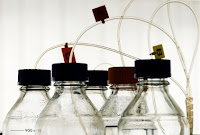Join us in Dublin
this May to learn about how to get the most out of HPLC. We are offering four HPLC
training courses from our 'How to...' series which are designed to provide
both theoretical and practical advice, enabling straight to lab application.
Whether you are a complete beginner or are already using HPLC we can
help to develop your expertise.
The courses are
as follows:
How to Run HPLC
Methods: Monday 20th May
2013
Ideal for anyone new to HPLC, this course will demystify all
the parameters required to run a HPLC method.
How to Troubleshoot HPLC: Tuesday 21st May
2013
Will suit HPLC users who want to be able to keep their HPLC
system up and running, by sorting out problems as they occur.
We are offering the following discounts until 25th April
2013:
€350 per person per day, 2 days for €650, 3 days for €950
or 4 days for €1250
Academic discounts and group discounts also available
up to 25th April,
contact us for a quote.
After 25th April all courses are charged at full price of
€425 per person per day.
Note: All prices are quoted exclusive of VAT
Includes:
- Comprehensive handouts for each course containing useful
reference data.
- Free tools to help you use HPLC efficiently.
- A Certificate of Attendance. There is an optional
post training assessment to obtain a Certificate of Training.
- Expert Advice from the MTS trainer on your HPLC
problems, both on the day of the training and after the event.
Click here for a printer friendly summary of these courses.
 Chromatography Modelling in High Performance Liquid Chromatography Method Development
Chromatography Modelling in High Performance Liquid Chromatography Method Development







